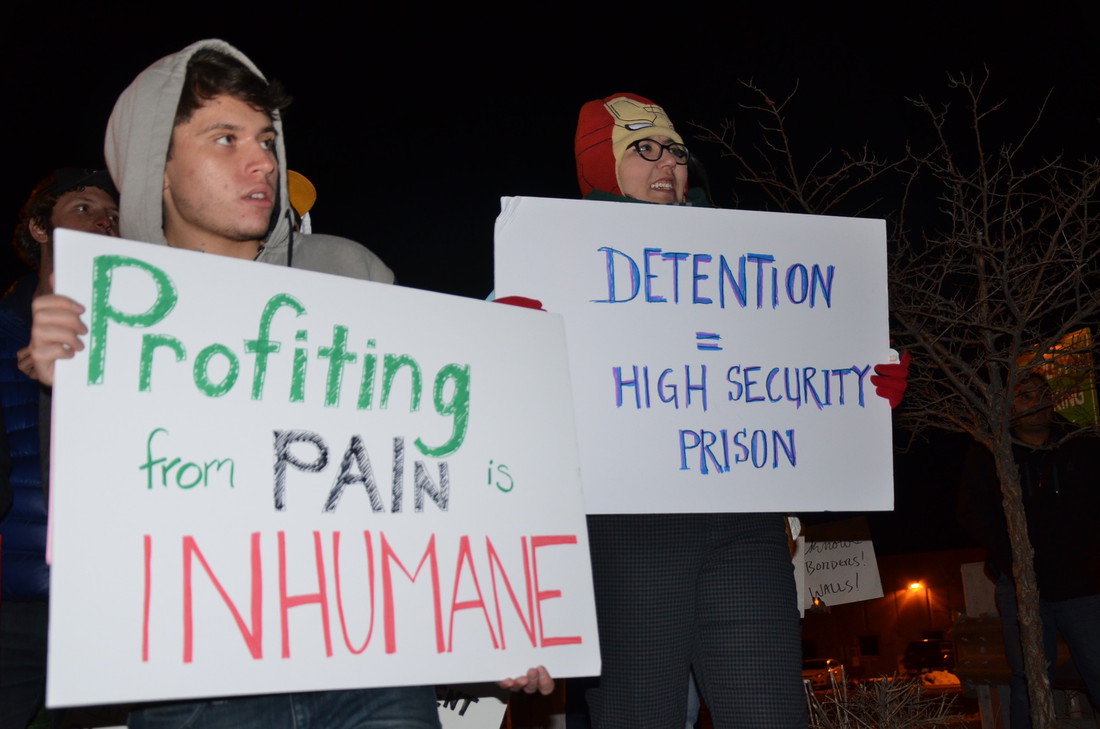
Community members demonstrate against immigrant detention outside of a GEO facility in Colorado. Gabriela Flora / AFSC
Back in August, the Obama administration issued a memo that many hoped signaled an end to the government's use of for-profit prison corporations. That memo, issued by then-Deputy Attorney General Sally Yates, stated that the Justice Department would stop contracting with CoreCivic (formerly Corrections Corporation of America) to run 13 federal prisons.
This directive was a symbolic win for many of us who opposed these contracts, and we were thrilled when stocks in CoreCivic and GEO Group, another for-profit prison corporation, plummeted as a result.
But the election of Donald Trump dashed a lot of those hopes. Quickly acting on his campaign promise to be "tough on crime," Trump issued more than 13 executive orders within his first month in office, including:
- directing Immigration and Customs Enforcement (ICE) to aggressively pursue the removal of undocumented immigrants, regardless of whether they have committed serious crimes;
- further militarizing the U.S.-Mexico border and hiring thousands more immigration enforcement officers;
- barring immigration from several majority Muslim countries; and
- creating a "task force on crime reduction and public safety."
 It's no surprise that CoreCivic and GEO stocks surged with the announcement of the potential detention and deportation of millions of undocumented immigrants as well as a resurgence of a federal crackdown on marijuana. These corporations could now expect even more bodies to fill their facilities.
It's no surprise that CoreCivic and GEO stocks surged with the announcement of the potential detention and deportation of millions of undocumented immigrants as well as a resurgence of a federal crackdown on marijuana. These corporations could now expect even more bodies to fill their facilities.
Even more good news for corporations? Just as Americans were learning about these executive orders, Congress confirmed Trump's nominee for attorney general, Jeff Sessions.
And as one of his first acts in his new position, Sessions issued a memorandum rescinding the Obama administration’s August 2016 directive on private prisons. In a one-paragraph memo, Sessions simply directed the Bureau of Prisons "to return to its previous approach."
The 2016 memo under Obama cited several reasons for the federal government's decision to move away from private prison management corporations, stating that these companies "compare poorly to our own Bureau facilities; … do not provide the same level of services, programs and resources; do not save substantially on costs; and do not maintain the same level of safety and security."
If all the facts point to the critical failures and dangerous conditions of private prison management companies, why would the Department of Justice under Trump rescind the original directive?
The Sessions memo clearly states the reason: "[the previous policy] impaired the Bureau’s ability to meet the future needs of the federal correctional system."
Future needs? Statistics show that crime is down and fewer immigrants are entering the country than ever before.
So what kind of future needs is the Trump administration anticipating? More incarceration for nonviolent crimes? Detaining an unprecedented number of immigrants? I would say the answers are YES and YES. And here's why.
Currently, ICE incarcerates over 40,000 people a day in immigration detention centers—a figure driven in part by an inhumane federal policy known as the "detention quota." This quota was designed to line the pockets of for-profit prison corporations, like CoreCivic and GEO, that are contracted to run most of the country’s largest detention centers.
In January, the White House issued a memo to Homeland Security officials calling for ICE to double the number of people it incarcerates daily to 80,000 nationwide.
In the budget Trump sent to Congress on March 16, he called for an additional $1.5 billion for detention and deportation, which would allow for an additional 17,000 immigrants to be detained each day.
Any dramatic increase would require creating more detention centers, which would most likely be built and managed by for-profit corporations. The more people are locked up, the more money private prison corporations make. Incarcerating thousands more immigrants a day means more profits for CoreCivic and GEO shareholders—all thanks to our government's commodification of human beings.
These policies under Trump are a collective problem that we must take on as a society. Mass incarceration is not just a criminal justice issue. It is about immigrant rights, education, and racial justice. We are at a point where intersectionality of our movements is crucial.
We must recognize that cries of "No more immigration raids!" and "Black Lives Matter" are essentially denouncing the same root problem—criminalization, often of marginalized communities, and abuse of power.

It is no longer enough to say, "No to mass incarceration!" and "We need alternatives to detention!" These "alternatives" have also become hijacked by the private prison industry—things like ankle monitoring, halfway houses, and other community-based programs are now contracted out to the same for-profit companies that run the detention centers.
As horrifying as the Trump administration's recent steps backward undoubtedly are, they provide us with a critical opportunity. The blatant pandering to special interests inherent in these actions are a perfect lens through which to critique the fundamental fallacy of our "justice" system—these policies are clearly not about safety or justice. They are about social control and profiteering.
We must unite to stop this expansion through a collective effort in order to bring awareness to our communities, and defend and protect our neighbors and friends from the ensnaring practices of privatization.